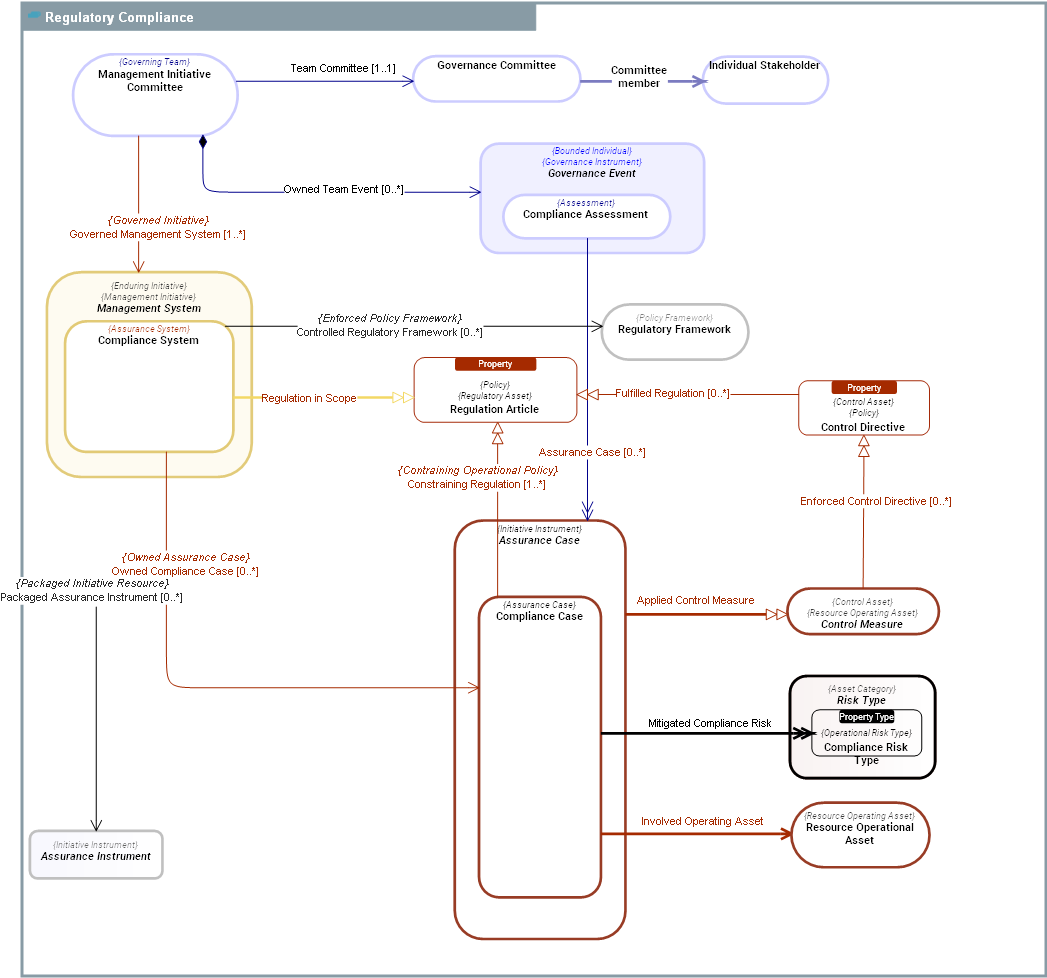CONCEPT DOMAIN - Regulatory Compliance
| Description | The Regulatory Compliance encompasses methodological concepts used in the process of ensuring that an enterprise complies with applicable laws, regulations, standards, and ethical practices relevant to its operations. This activity involves monitoring legal Regulatory Frameworks, implementing policies and procedures to meet those obligations, and conducting audits or assessments to verify adherence. Effective regulatory compliance helps mitigate legal risks, avoid penalties, and maintain trust with stakeholders while promoting ethical and responsible business conduct. It spans various areas, including data protection, financial reporting, environmental regulations, and industry-specific mandates. |
|---|---|
| Dictionary |  Dictionary of SysFEAT concepts
Dictionary of SysFEAT concepts |
| Parent Domain |  SysFEAT Enterprise Domains
SysFEAT Enterprise Domains |
| Domain dependencies |  Appraisal Pattern
Appraisal Pattern  Operational Assurance
Operational Assurance |
DOMAIN CONCEPT GRAPH

CONCEPT DESCRIPTIONS
ABSTRACT CONCRETE
| Concept | Description |
|---|---|
 Assurance Case
Assurance Case |
An Assurance Case is a claim that a particular enterprise asset or group of Functional Asset adequately mitigates certain identified Risk Types by means of appropriated Control Measures. An Assurance Case shall provide confidence that the concerned assets will function as intended in their environment of use. Privacy Processing Activity(ies), Data Lineages are examples of Assurance Cases .
|
 Assurance Instrument
Assurance Instrument |
An Assurance Instrument is a resource or course of actions used by an Assurance System to achieve its objectives. For instance: Actions plans are course of actions aimed at solving incidents. Data Controls are mechanisms used to ensure data quality and data integrity Privacy Representatives are used to identify national entities in charge of privacy. |
 Governance Event
Governance Event |
A Governance Event is any event that has an impact on the management and governance of an Enduring Initiative. |
 Management System
Management System |
A Management System is a mezzo Enduring Initiative within an Enterprise, aimed at creating, maintaining, evaluating, evolving, and operating a collection of essential Functional Architecture Assets of the Enterprise. A Management System may transcend organisational boundaries and consequently requires an integrated team working under the direction of a Management Initiative Committee.
|
 Resource Operational Asset
Resource Operational Asset |
A Resource Operational Asset is a kind of Resource Operating Asset (agent or behavior) that is involved in core operations, as distinct from Resource Operating Assets that govern their security and reliability (Control Measures). |
 Risk Type
Risk Type |
A Risk Type is a distinct category or classification of risk based on its origin, nature, or potential impact. It helps in organizing and addressing different sources of uncertainty or potential harm that an individual, organization, or system might face. By categorizing risks into different types, entities can develop more targeted mitigation strategies and response plans. Common risk types include Operational Risk Type, Privacy Risk Type, and Compliance Risk Type, among others, |
SERIALIZATION FORMAT
TEXTUAL SYNTAX RDF
 NIST - Assurance Case
NIST - Assurance Case